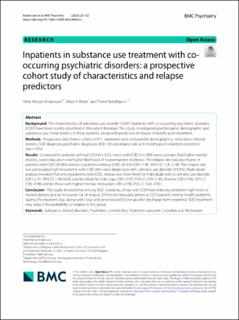| dc.description.abstract | Background
The characteristics of substance use disorder (SUD) inpatients with co-occurring psychiatric disorders (COD) have been scantly described in the extant literature. This study investigated psychological, demographic and substance use characteristics in these patients, along with predictors of relapse 3 months post-treatment.
Methods
Prospective data from a cohort of 611 inpatients were analyzed for demographics, motivation, mental distress, SUD diagnosis, psychiatric diagnoses (ICD-10) and relapse rate at 3 months post-treatment (retention rate = 70%).
Results
Compared to patients without COD (n = 322), those with COD (n = 289) were younger, had higher mental distress, lower education and higher likelihood of no permanent residence. The relapse rate was also higher in patients with COD (39.8%) relative to patients without COD (26.4%) (OR = 1.85, 95% CI: 1.23–2.78). The relapse rate was particularly high for patients with COD who were diagnosed with cannabis use disorder (53.3%). Multivariate analysis revealed that among patients with COD, relapse was more likely for individuals with a cannabis use disorder (OR = 2.31, 95% CI: 1.34-4.00), and less likely for older ages (OR = 0.97, 95% CI: 0.94-1.00), females (OR = 0.56, 95% CI: 0.33–0.98) and for those with higher intrinsic motivation (OR = 0.58, 95% CI: 0.42–0.81).
Conclusion
This study showed that among SUD inpatients, those with COD had relatively persistent high levels of mental distress and an increased risk of relapse. Enhanced measures aimed at COD patients’ mental health problems during the inpatient stay, along with close and personalized follow-up after discharge from residential SUD treatment may reduce the probability of relapse in this group. | en_US |

